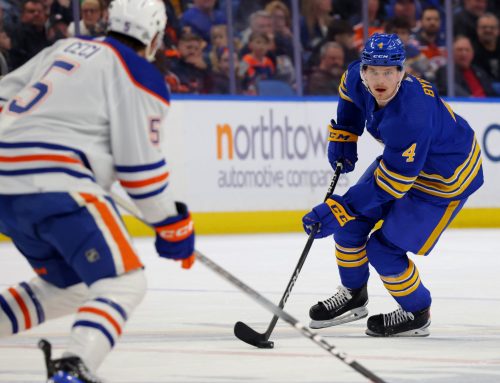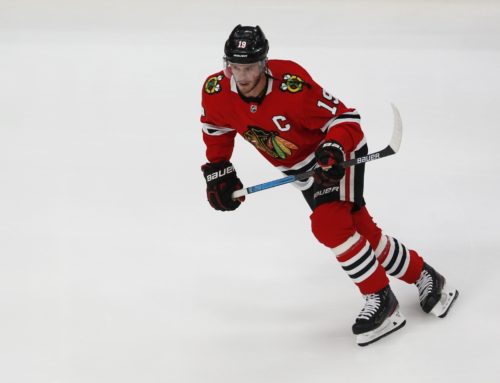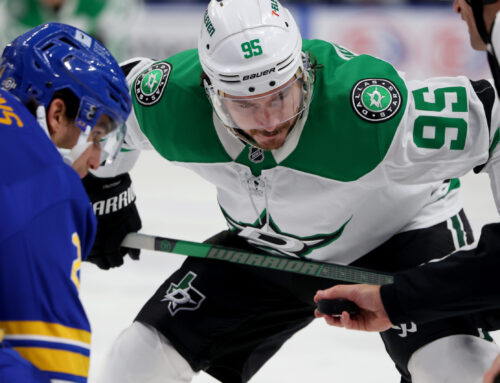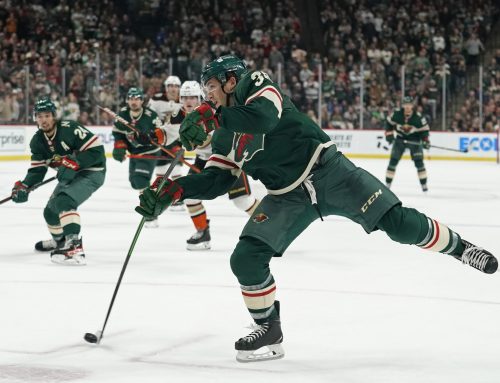
Throughout the summer, I’m going over each team one at a time, reviewing the fantasy performances for some of the more relevant players. This Ramblings will discuss the Dallas Stars. I’m not going to discuss the goaltending, the reasons why should be pretty obvious.
Before going into individual players, remember that evaluations of this team has to be done in the context of injuries: Mattias Janmark missed the entire season; Jamie Benn was recovering from offseason injury (that will be discussed a little later); Jason Spezza missed 14 games; Patrick Sharp played fewer than 50 games; Jiri Hudler missed over half the season; Cody Eakin missed about a quarter of the season; Ales Hemsky missed most of the season; Antoine Roussel missed the final six weeks-ish weeks. That doesn’t even count Valeri Nichushkin leaving for Russia. That means Sharp, Hudler, Hemsky, Janmark, and Nichushkin – all players expected to play in Dallas’s top-9 this past season – all missed close to, or more than, half the year. A team can only sustain so many losses before it reaches a critical mass.
Out of all the Stars skaters, Seguin is probably the one who disappointed the least. He failed to reach 30 goals, which would have been his fourth straight 30-goal campaign, but he did manage at least 70 points for the fourth consecutive season, set a career-high in shots on goals (308), and tied a career-high in power-play points (29). He didn’t live up to his fantasy draft position, but things could have been a lot worse.
The most curious aspect of Seguin’s season isn’t his production, it’s the fact that even with all the injuries, he played nearly a full minute less per game in 2016-17 than he did in 2015-16. That is significant, as he managed 3.24 points per 60 minutes in all situations from 2013-16. Even if he were just his Dallas-era average, the drop in ice time alone would mean about five fewer points. It was a conscious decision, too, as he averaged over 19 minutes a game from the start of the year until New Year’s Day, and under 18 minutes a game after when he and Benn were split up.
Yup! He and Jamie Benn were on different lines. Benn's line was the "first" line, and Seguin's was the second, therefore, less TOI
— Carolyn Wilke (@Classlicity) June 4, 2017
There will be a new coaching staff, so there’s no telling if this will continue. It is worth noting however.
A career-worst 7.11 percent shooting at five-on-five was the big culprit for a decline in goals. It’s weird, too, because his shot rates were normal, and it appears he was getting in good positions to shoot (via HockeyViz.com):


One big concern, of course, is the fact that he had offseason shoulder surgery. All indications are that he’ll be ready and health for training camp, but as we saw with Benn, rehabbing surgery in the offseason doesn’t mean that he’ll be in top form come October (yes I’m aware they’re different injuries). Maybe he will, maybe he won’t. He should drop out of the top-10 in drafts given his performance and injury, which either makes him a value selection or a sucker’s bet. It depends how you think he’ll rebound from surgery.
It was clear early in the season that Benn wasn’t quite himself after recovering from offseason hip (core?) surgery. He had just 87 shots in his first 38 games, which is considerably less on a per-game basis than he managed in recent seasons. As the year wore on, he was sometimes skipping practices in order to minimize his usage. He did post 16 goals in his final 39 games, managing nearly three shots a game, which is much more what we expect from one of the world’s best wingers.
There is one trend that is raising some red flags for me: this is the third straight year of declining shot attempts per minute at five-on-five since a career-high in 2013-14. It’s fair to say that after having hip surgery in each of the previous two years contributed to that, but that’s also the problem here. Goal-scoring power forwards tend not to age very well, and Benn will be 28 years old with a few hip surgeries under his belt in the last couple of years. That’s not to say he’ll fall off the map, but three years ago he finished the year among the league leaders in shot attempts per minute; over the last two seasons, he’s shot about as often as Brian Boyle.
So, the two big questions for Benn in 2017-18 are, A) is he fully healthy and B) is he going to play with Seguin again? These are two questions of utmost importance, and yet we’ll have no real idea until the season starts. This makes Benn a very interesting player to follow going into draft season. He can be a 35-goal, point-per-game player, or he can be what we saw last year. That’s a huge gap in outcomes, which is going to make his ADP paramount.
Remember early in the season when Klingberg had no goals and three points through the month of October? He finished tied for 10th in points among d-men (49), and ninth in goals among d-men (13). It’s safe to say he recovered very well.
As Dallas suffered, so did Klingberg’s production. The team scored just 2.72 goals per 60 minutes at five-on-five with him on the ice (it was over 3.00 for his career), and that’s despite the team shooting over nine percent. His increased ice time helped make up for the lack of efficiency, but that doesn’t really matter to us. All that matters is the production at the end of the year. Also, I can’t imagine there’s reason to be concerned about a drop in ice time for 17-18. He’s the team’s best defenceman, and the new coaching staff should know that.
What is concerning is Klingberg lost some power-play time as he scuffled a bit over the year. He didn’t lose any at a per-game rate, but Julius Honka did take some top minutes away from him at different points in the season. The power-play wasn’t itself, dropping from the top-5 in 2015-16 to mid-pack in 2016-17 in goals per minute, and again, injuries had to have played a bit of a factor here. A new coaching staff should also bring in a new power-play philosophy, so hopefully they can regain their form.
I don’t have any real concern for Klingberg, at present time, for when draft day approaches. The shot rate is a problem as it cratered both at five-on-five and five-on-four from the year previous, but there really isn’t much of a track record here; there’s three-quarters of a season, a full year where he was great, and a full season where he was not. If anyone can read into that, let me know. He is still the top option on the blue line for a team that features a lot of firepower. He should still be drafted among the top-15 defencemen come September unless the makeup of the team changes considerably over the next month.
At 16:10 per game, Spezza was given the fewest minutes he had played in any season since the 2005 lockout. He turns 34 years old next week, so it’s a wonder how much he has left in the tank. Injuries no doubt played a part in his season, which is probably why after increasing his shot attempt rates at five-on-five every year he was in Dallas, it dipped to his lowest mark in an 82-game season since 2009-2010.
Even with just 68 games played, Spezza’s 17 power-play assists were the second-most he managed in an 82-game seasons since 2008-09 (he had 22 in 2014-15). That is a big reason why his overall assists per game (0.5) was nearly identical to his three-year average with Dallas (0.51). As long as he stays on the top power-play quintet – and he should – I don’t have much concern of his production falling off a cliff.
Where there is concern is his role. Even on an injury-plagued team, Spezza was often moved to the wing, or down the lineup. Now, that was under the old regime, so what the new regime decides to do with him is completely uncertain. However, if he only plays around 16 minutes a game again, he’ll be hard-pressed to manage much more than 60 points in a full, healthy season.
****
On a final note, the Stars are probably one of the more intriguing teams going into the 2017-18 season as there is in the NHL. They were crippled by injuries, yet still managed to stay out of the bottom-third of the league in adjusted shot attempt percentage (finishing just below Anaheim). They are a year removed from being a game away from the Western Conference Final (doing so without Seguin in the lineup). The core of their team is still in their twenties, and have good young defencemen like Honka and Esa Lindell who could be ready for a bigger role. Lindy Ruff is gone from behind the bench, and they already added Ben Bishop to solidify their goaltending. They also have two first-round picks, including the third overall. There are a few forward spots to fill, and Nichushkin may even return. There are a lot of reasons to follow the Stars in the offseason, and could be a team due for a serious rebound. There are interesting months ahead.
2 Comments
Leave A Comment
You must be logged in to post a comment.





 CHI
CHI SEA
SEA FLA
FLA DAL
DAL WPG
WPG CBJ
CBJ L.A
L.A NSH
NSH BUF
BUF S.J
S.J MTL
MTL

These are interesting reads, but I don’t see the value in beginning these columns until after player movement has at least petered off in July. Many of the teams covered before the draft and free agency will look vastly different.
A note on John Klingberg: as a keeper owner, last season I recall being stung on a couple of occasions when he was a late healthy scratch. Different coaching staff, but his play was awful at times last season, not just in fantasy.
Thank you for reading, and I do agree that teams will have a different look in a month or two. The basic idea is to review the significant fantasy contributors and figuring out whether they over-performed or under-performed, and what that means for next year on the individual level.